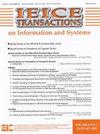使用欠采样k空间数据的脑肿瘤分类:一种深度学习方法
IF 0.8
4区 计算机科学
Q4 COMPUTER SCIENCE, INFORMATION SYSTEMS
IEICE Transactions on Information and Systems
Pub Date : 2023-11-01
DOI:10.1587/transinf.2022edp7198
引用次数: 0
摘要
我们评估了最近创建的MRI重建技术,多分辨率卷积神经网络(MRCNN)在核心医学视觉领域(分类)中的表现。MRCNN的主要目标是识别最佳的k空间欠采样模式来加速MRI。在这项研究中,我们使用Figshare脑肿瘤数据集对3064个t1加权对比增强MRI (CE-MRI)进行MRI分类,分为三类:脑膜瘤、胶质瘤和垂体瘤。我们将MRCNN应用于数据集,这是一种从欠采样k空间信号重建高质量图像的方法。接下来,我们将预先训练好的基于深度神经网络(Deep Neural Network, DNN)的图像分类器VGG16模型应用到MRCNN恢复的核磁共振图像中,对脑肿瘤进行分类。我们的实验表明,在MRCNN恢复数据的情况下,在10%的采样率下,所提出的脑肿瘤分类器的分类准确率达到了92.79%,略高于SRCNN、MoDL和Zero-filling方法的91.89%、91.89%和90.98%。请注意,我们的分类器是使用由完整采样的图像及其标签组成的数据集进行训练的,这可以被视为通常的人类诊断学家的模型。因此,我们的研究结果表明,MRCNN对人类的诊断是有用的。综上所述,MRCNN显著提高了基于肿瘤定位的基于欠采样k空间信号的脑肿瘤分类系统的准确性。本文章由计算机程序翻译,如有差异,请以英文原文为准。
Brain Tumor Classification using Under-Sampled k-Space Data: A Deep Learning Approach
We assess how well the recently created MRI reconstruction technique, Multi-Resolution Convolutional Neural Network (MRCNN), performs in the core medical vision field (classification). The primary goal of MRCNN is to identify the best k-space undersampling patterns to accelerate the MRI. In this study, we use the Figshare brain tumor dataset for MRI classification with 3064 T1-weighted contrast-enhanced MRI (CE-MRI) over three categories: meningioma, glioma, and pituitary tumors. We apply MRCNN to the dataset, which is a method to reconstruct high-quality images from under-sampled k-space signals. Next, we employ the pre-trained VGG16 model, which is a Deep Neural Network (DNN) based image classifier to the MRCNN restored MRIs to classify the brain tumors. Our experiments showed that in the case of MRCNN restored data, the proposed brain tumor classifier achieved 92.79% classification accuracy for a 10% sampling rate, which is slightly higher than that of SRCNN, MoDL, and Zero-filling methods have 91.89%, 91.89%, and 90.98% respectively. Note that our classifier was trained using the dataset consisting of the images with full sampling and their labels, which can be regarded as a model of the usual human diagnostician. Hence our results would suggest MRCNN is useful for human diagnosis. In conclusion, MRCNN significantly enhances the accuracy of the brain tumor classification system based on the tumor location using under-sampled k-space signals.
求助全文
通过发布文献求助,成功后即可免费获取论文全文。
去求助
来源期刊

IEICE Transactions on Information and Systems
工程技术-计算机:软件工程
CiteScore
1.80
自引率
0.00%
发文量
238
审稿时长
5.0 months
期刊介绍:
Published by The Institute of Electronics, Information and Communication Engineers
Subject Area:
Mathematics
Physics
Biology, Life Sciences and Basic Medicine
General Medicine, Social Medicine, and Nursing Sciences
Clinical Medicine
Engineering in General
Nanosciences and Materials Sciences
Mechanical Engineering
Electrical and Electronic Engineering
Information Sciences
Economics, Business & Management
Psychology, Education.
 求助内容:
求助内容: 应助结果提醒方式:
应助结果提醒方式:


